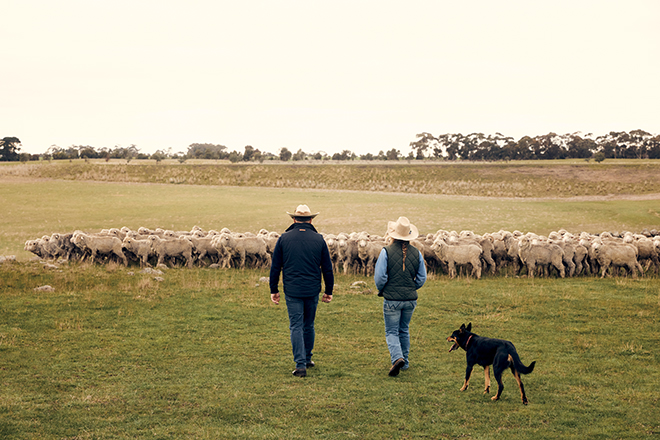The Merino wool used in the Helen Kaminski brand's Woolmark-certified Conscious collection of hats is traceable to a single property in Victoria.
Australian based fashion accessories brand Helen Kaminski has launched a traceability initiative in which the Merino wool used in the brand's Conscious collection of hats is sourced from wool-growing property Barunah Plains in Victoria.
Founded in Australia in 1983, Helen Kaminski is a globally coveted brand renowned for beautiful, modern accessories that inspire confidence, reflect individual style, and are handcrafted to last. Each piece is made with special care by artisans, handcrafted using traditional techniques and the finest raw materials. The brand's distinctive and unique collection of designs have been worn by celebrities and influencers around the globe.
Under the vision of head of design and development Pernille Sejer, the brand continues to celebrate the optimistic spirit of Australian design, craftspersonship and commitment to sustainability.
The brand is working towards greater supply chain visibility so consumers can see that its accessories are not only crafted with expertise and care, but also with our planet in mind, helping to create a more sustainable future.
Merino wool Conscious collection of hats
The brand's ultra-fine wool felt Conscious collection encapsulates Helen Kaminski's considered and mindful use of materials. The 'hat hoods' used in the collection are made from traceable and responsibly sourced pure Merino wool from wool-growing property Barunah Plains, located about 40kms west of Geelong, Victoria.
Helen Kaminski's Honest Wool initiative is part of the brand's ongoing commitment to creating ethical, everyday luxury: one that leaves a positive impact on animals, people and the planet.
"My design team are proud to be working with pure Merino wool and the customers are responding so well to the fibre that it has become a true staple at Helen Kaminski," said Pernille.
Transparency through the supply chain
Knowing where, and how, the products we wear are made is more important than ever, and transparency is key. The pure Australian Merino wool used in the brand's Conscious collection is entirely traceable.
After shearing at Barunah Plains, the wool is cleaned and scoured at E.P. Robinson in Geelong before being sent to Italy for carding and combing. The wool is rolled and felted in Portugal using heritage techniques and machinery to give a tightly woven, luxurious feel. The hat hoods then travel the short distance to Spain where they are shaped by hand into hats before they are transported to Helen Kaminski global distribution hubs.
Each carefully handcrafted hat in the collection is Woolmark-certified and embodies lasting everyday luxury.
Barunah Plains

Owner of Barunah Plains, Damian Canny, and one of his three daughters inspecting some of the property's Merinos.
Nestled amongst a tapestry of rolling pastures and beautifully restored heritage buildings, Barunah Plains is home to more than 2,500 Merinos.
Regenerative farming and positive animal welfare led to the Helen Kaminski brand's partnership with woolgrower Damian Canny of Barunah Plains Pastoral Company to supply the Merino wool for the brand's Conscious collection.
"We immediately fell in love with Barunah Plains and with Damian's approach to business and farming. Unlike wool from other parts of the world, Barunah Plains is not just 100% Australian Merino: it's completely pure and entirely traceable," said Pernille.
Damian has been growing wool for nearly 20 years and he's passionate about building and promoting the positive eco-credentials of wool at Barunah Plains.
"We look after the land by not stocking it too heavily. If we're running out of feed, we look somewhere else to put our livestock for a period of time to let the land regenerate," Damien said.
"We keep our eye on noxious weeds and the creek that runs through Barunah Plains. We try to look after the land as best we can and leave it in a better way than how we found it.
"In terms of traceability, knowing where something comes from – especially when it involves an animal, is ethically important. When you can see the 'thread' of the whole story, you know that it's positive."






